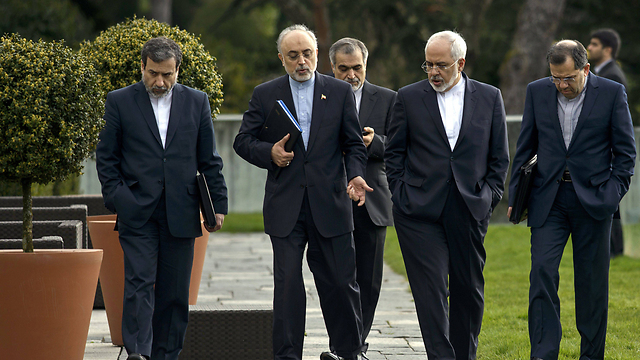How Iran desires to dominate the Middle East
Majid Rafizadeh/Al Arabiya
Sunday, 26 April 2015
Recently, there has been a tactical shift in Iran’s foreign policy and a change in the stance of the Islamic Republic’s Revolutionary Guards Corps (IRGC).
Iranian leaders now do not appear to publicly shy away from achieving their ideological and political objectives in the Gulf region and wider Middle East. Tehran officials now boast about the notion that they have influence and power from the Mediterranean Sea to the Bab el-Mandeb in Yemen. The Iranian Supreme National Security Council’s Secretary Ali Shamkhani pointed out: “Iran has linked to Bab el-Mandeb and to the Mediterranean.” In addition, Habibollah Sayyari, an Iranian naval commander stated “There are nine important sea passages in the world, and Iran oversees five of them… The security of the Gulf of Aden and the international waters are important to Iran.”Iranian leaders have also acclaimed the Houthi militias for their efforts in the fighting and boasted about Tehran’s control of several Arab capitals. The underlying foundations of the Islamic Republic’s foreign policy have become officially more public by revealing the IRGC’s attempts to exert political, ideological, and economic influence in the countries in the region, be the hegemon, and dominate the Middle East. Nevertheless, the question is how the Islamic Republic managed to expand its military and political influence in the Middle East, even though it has been under international economic sanctions and an arms embargo? What kind of methods does Tehran rely on?
Postmodern imperialism
Iran’s military institutions utilize a unique form of postmodern expansionism and imperialism when it comes to achieving its foreign policy objectives of dominance. The ideological aspect of Iran’s foreign policy drives the IRGC to spread the Islamic Republic’s values through financing, arming, and supporting Shiite extremist groups in several nations in the Middle East There are three crucial platforms utilized by the Iranian political system to ensure their ideological, military, political expansionism and dominance in the Middle East.
The first approach is through infiltrating the security, political and military ranks of a given country in the Middle East in order to more efficiently control the political developments in that nation and serve Tehran’s national, geopolitical, strategic, military, economic and ideological interests. This approach provides Tehran with almost a complete control over the other nation’s political process and decision-making. It is conducted by building an ideological, military, political and economic alliance with the leadership of the country. It is also a method of post-colonialism.
Irregular warfare
If this approach is doomed to fail and if the given nation-state did not submit to Iran’s political and ideological demands, Tehran’s second approach is somehow unique: irregular warfare. In the second platform, Tehran will either make an alliance with one or several Shiite extremist groups in the given nation or will create a new proxy by financing, arming, training and supporting a militia through the Quds Force and IRGC. The third tactic is to avoid officially setting up a military base in other countries, but to deploy Quds forces in various sections of the country. Iran avoids publicly raising concern of the regional countries by declaring that Tehran has officially established a military base in an Arab state. The senior cadre of IRGC are cognizant of the fact that they have been proficient at expanding their military power across the region through covert operations rather than overt ones. In other words, similar to Tehran’s nuclear program, Iran’s foreign policy and its military agenda have predominantly been based on covert and underground landscapes.
Predominantly three institutions- senior official of IRGC, Quds Force (the foreign and paramilitary arm of the Revolutionary Guard), and the Ministry of Intelligence and Security- exert their influence in other nations through these postmodern militaristic expansionism and imperialism. In addition, the ideological aspect of Iran’s foreign policy drives the IRGC to spread the Islamic Republic’s values through financing, arming, and supporting Shiite extremist groups in several nations in the Middle East.
Ideological expansion
Over the last three decades, through these approaches, Iran’s military institutions have expanded its military from Syria, Afghanistan, Lebanon, Bahrain, Iraq, to Yemen. The first method of infiltrating the security, military and political establishments of a nation has functioned for the Islamic Republic in Iraq and Syria. For example, when it comes to Syria, the Islamic Republic never declared that it has military bases in the country or that it is conducting military operations. Nevertheless, the IRGC has managed to dominate Syrian political and economic systems through a new form of control. Iran has infiltrated the security and military ranks of the Syrian forces, dominating politics more efficiently from top. Although there is no concrete Iranian military base in Syria, the Quds forces and senior cadre of Iranian government have been repeatedly deployed to advise and conduct military operations on the ground. In addition, the military, economic, and intelligence assistance to the Assad’s government further bolster Tehran’s influence in Syria.
In Iraq, Iran has implemented the same agenda securing the dominance of the Shiite government. Iranian forces are almost directing every aspect of the battles and political process in Iraq through the Quds forces and its advisory mechanism. When dominating a country from the top fails, the IRGC has utilized the second bottom-up approach, such as in Bahrain, Yemen and Lebanon. Over the past three decades, the IRGC, the Quds Force and the Ministry of Intelligence and Security have incrementally spread their influence and ideologies across the Middle East. Although Iran’s foreign policy of dominance and intervention have created resistance among ordinary people in other nations, the IRGC and the establishment of ruling clerics still remain to be determined in ratcheting up their military projection and power in other nations




















